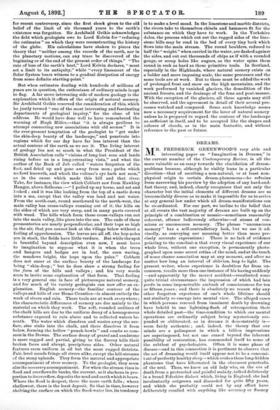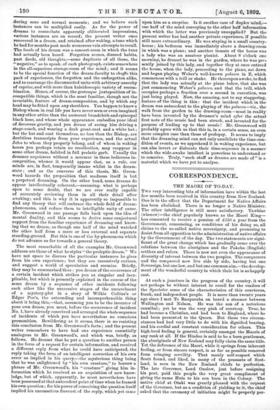DREAMS.
MR. FREDERICK GREENWOOD'S very able and interesting paper on "Imagination in Dreams," in the current number of the Contemporary Review, is all the more valuable as an essay towards the elucidation of dream- problems because, although he visibly leans in a particular direction—that of ascribing a non-natural, or at least non- physical origin to certain dream-phenomena—he refrains from narrowing his purview by the adoption of any hard-and- fast theory, and, indeed, clearly recognises that not only the character but the initial elements of different dreams are so irreconcilably diverse as to make it impossible for us to arrive at any general law under which all dream-manifestations can be co-ordinated. For our part, we incline to the belief that at all events the vast majority of dreams are built up on the principle of a combination or mosaic—sometimes reasonably coherent, oftener ludicrously otherwise—of atoms of con- scious or unconscious memory. (The phrase "unconscious memory" has a self-contradictory look, but we use it ad- visedly, as conveying our meaning better than more pre- cisely accurate expressions.) There is no lack of evidence pointing to the conclusion that every visual experience of our whole lives, without one exception, is permanently photo- graphed upon some secret retina of the mind, and at the touch of some chance association may at any moment, and after no matter how long an interval of oblivion, leap to light. The present writer, whose experience is doubtless far from un- common, recalls more than one instance of his having suddenly —and apparently by the merest accident—recollected some quite trivial circumstance the impression of which had lain perdu in some impenetrable ambush of consciousness for ten or fifteen years ; and there is absolutely no reason why any other forgotten experience of one's whole lifetime should not similarly re-emerge into mental view. The alleged cases in which persons rescued from imminent death by drowning have beheld in one lightning-flash of retrospection their whole detailed past—the time-condition to which our mental operations are ordinarily subject being mysteriously sus- pended or obliterated, as in dreams it demonstrably is— seem fairly authentic ; and, indeed, the theory that our minds are a palimpsest in which a billion impressions are superimposed, but not one erased beyond the inherent possibility of restoration, has commended itself to some of the subtlest of psychologists. Often it is some phase of disease—and in this connection it is pertinent to observe that
the act of dreaming would itself appear not to be a concomi- tant of perfectly healthy sleep —which evokes these long-hidden phantoms that have hibernated in the obscurest penetralia of the soul. Thus, we knew an old lady who, on the eve of death from a protracted and painful malady, talked deliriously in a broad Ftfeshire dialect which, living in England, she had involuntarily outgrown and discarded for quite fifty years, and which she probably could not by any effort have deliberately recalled with anything like accuracy or fluency during sane and normal moments ; and we believe such instances can be multiplied easily. As for the power of dreams to resuscitate apparently obliterated impressions, various instances are on record; the present writer once recovered in a dream, and retained after waking, a tune which he had for months past made numerous vain attempts to recall. The locale of his dream was a concert-room in which the tune had actually been heard. Forgotten scenes, disused habits, past deeds, old thoughts,—some duplicate of all these, the "negative," so to speak, of each photograph, exists somewhere in the all-capacious storage-room of the mind ; and it seems to be the special function of the dream-faculty to shuffle this pack of experiences, the forgotten and the unforgotten alike, and to rearrange the disconnected units with arbitrary anarchy of caprice, and with more than kaleidoscopic variety of recom- bination. Hence, of course, the grotesque juxtaposition of in- compatible things, which is the most familiar, though not the invariable, feature of dream-composition, and by which any head may be fitted upon any shoulders. You happen to know a Bishop whom in real life you have never seen or even imagined in any other attire than the austerest broadcloth and episcopal black hose, and whose whole appearance embodies your ideal of decorous gravity, and you dream of seeing him driving a stage-coach, and wearing a drab great-coat and a white hat ; but the hat and coat themselves, no less than the Bishop, are doubtless transcripts from your experience, and the actual Jehu to whom they properly belong, and of whom in waking hours you perhaps retain no recollection, may reappear in some other dream, habited in full prelatic garb. Usually the dreamer acquiesces without a murmur in these ludicrous in- congruities, whence it would appear that, as a rule, our minds are, in fact, temporarily insane whilst in the dream- state ; and as the converse of this thesis, Mr. Green- wood hazards the proposition that madness itself is but a perpetual dreaming. On the other hand, some dreams do appear intellectually coherent,—assuming, what is perhaps open to some doubt, that we are ever really capable of accurately reviewing them in all their detail after awaking; and this is why it is apparently so impossible to find any theory that will embrace the whole field of dream- phenomena, and reduce them to intelligible unity of cause. Mr. Greenwood in one passage falls back upon the idea of mental duality, and this seems to derive some conjectural support from the familiar experience of dreaming and know- ing that we dream, as though one half of the mind watched the other half from a more or less external and separate standing-ground. But this is one of the by-phenomena which do not advance us far towards a general theory.
The most remarkable of all the examples Mr. Greenwood adduces are those of what he styles" the proleptic dream." We have not space to discuss the particular instances he gives from his own experience ; but they are excessively curious, and suggest a world of speculation and surmise. Briefly, they may be summarised thus : you dream of the occurrence of a certain incident which strikes you as singular and inex- plicable, but which is presently explained in the course of the same dream by a sequence of other incidents following each other like the successive stages of the unravelment of a mystery-plot in a story of Wilkie Collins's or Edgar Poe's, the astounding and incomprehensible thing about it being this,—that, assuming you to be the inventor of your own dream, you must, before the occurrence of incident No. 1, have already conceived and arranged the whole sequence of incidents of which you have nevertheless no conscious premonition. Bewildering as it seems, there is no resisting this conclusion from Mr. Greenwood's facts ; and the present writer remembers to have had one experience essentially analogous to Mr. Greenwood's, and which was, briefly, as follows. He dreamt that he put a question to another person in the form of a request for certain information, and received a different reply from what he could have anticipated, the reply taking the form of an intelligent correction of his own error as implied in his query,—the mysterious thing being that he was enlightened by "his own creature," to borrow a phrase of Mr. Greenwood's, his "creature" giving him in- formation which he received as an acquisition of new know- ledge, but of which, apparently, he must nevertheless have been possessed at that antecedent point of time when he framed his own question ; for his power of conceiving the question itself implied his unconscious forecast of the reply, which yet came upon him as a surprise. Is it another case of duplex mind,— one half of the mind conveying to the other half information with which the latter was previously unsupplied P But the present writer has had another private experience, if possible still more extraordinary. He was staying in a small country- house ; his bedroom was immediately above a drawing-room in which was a piano; and another inmate of the house was a lady who was an amateur pianist. About 8 o'clock one morning, he dreamt he was in the garden, where he was pre- sently joined by this lady, and together they at once entered the house, when the lady, proceeding to the piano, sat down and began playing Weber's well-known polacca in E, which commences with a trill or shake. He thereupon awoke, to find that the lady was actually at the piano below, that she was. just commencing Weber's polacca, and that the trill, which occupies perhaps a fraction over a second in execution, was, just being played. Now, the amazing, not to say staggering, feature of the thing is this : that the incident which in the dream was antecedent to the playing of the polacca—viz., the walk from the garden to the drawing-room—must in reality have been invented by the dreamer's mind after the actual first note of the music had been struck, and invented for the- purpose of leading up to that music ! Mr. Greenwood will probably agree with us that this is, in a certain sense, an even more complex case than those of prolepsy. It seems to imply that the dreaming mind can not only annihilate the time-oon- dition of events, as we apprehend it in waking experience, but can also invert or dislocate their time-sequence in a manner- which the wide-awake intellect is powerless to understand or- to conceive. Truly, "such staff as dreams are made of" is a material which we have yet to analyse.



































 Previous page
Previous page